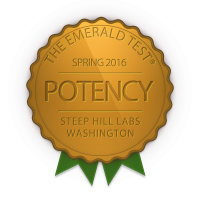Emerald Scientific recently announced results for their latest round of the semi-annual Inter-Laboratory Comparison and Proficiency Test (ILC/PT), and the outcomes may bode well for one of the most vital quality and safety aspects of the cannabis industry. According to Cynthia Ludwig, director of technical services at the American Oil Chemists’ Society (AOCS), there are no official methods for cannabis testing from an internationally recognized non-profit organization known to provide ‘official methods’ to various industries, so method validation needs to be done in-house, which is very costly and time-consuming. Cannabis testing labs are charged with the difficult task of providing honest, consistent and accurate results for potency, pesticide residue, residual solvents and contaminants. AOCS partnered with Emerald Scientific in this round of ILC/PT and preformed the statistical analysis and reports. For the first time in The Emerald Test’s history, participants were able to review all of the raw data and were given a consensus mean, z-scores and kernel density plots in order to compare themselves to other participants.
![]() Emerald Scientific’s ILC/PT program measures how accurately a cannabis lab performs along with comparing it to other labs for an indicator of variability and ways to improve, according to a press release. 46 cannabis laboratories participated in The Emerald Test’s latest round of proficiency testing for potency and residual solvents. Cynthia Ludwig sits on the advisory panel to give direction and industry insights, addressing specific needs for cannabis laboratories. Kirsten Blake, director of sales at Emerald Scientific, believes that proficiency testing is the first step in bringing consistency to cannabis analytics. “The goal is to create some level of industry standards for testing,” says Blake. Participants in the program are given data sets, judged by a consensus mean, so labs can see their score compared to the rest of the cannabis testing industry.
Emerald Scientific’s ILC/PT program measures how accurately a cannabis lab performs along with comparing it to other labs for an indicator of variability and ways to improve, according to a press release. 46 cannabis laboratories participated in The Emerald Test’s latest round of proficiency testing for potency and residual solvents. Cynthia Ludwig sits on the advisory panel to give direction and industry insights, addressing specific needs for cannabis laboratories. Kirsten Blake, director of sales at Emerald Scientific, believes that proficiency testing is the first step in bringing consistency to cannabis analytics. “The goal is to create some level of industry standards for testing,” says Blake. Participants in the program are given data sets, judged by a consensus mean, so labs can see their score compared to the rest of the cannabis testing industry.
 Proficiency tests like The Emerald Test give labs the ability to view how consistent their results are compared to the industry’s results overall. According to Ludwig, the results were pleasantly surprising. “The results were better than expected across the board; the vast majority of labs were within the acceptable range,” says Ludwig. The test is anonymous so individual labs can participate freely. “The overall performance of the participating labs in the Potency and Solvent Residue Emerald Test were very encouraging,” says Ludwig. “All but a couple of labs had the majority of their results fall within two standard deviations of the consensus mean, which is generally accepted as being within the acceptable limits to most evaluators.” Although requirements for labs testing cannabis differ in each state, Ludwig says the results show the ability of these labs to competently perform the tests and generate reliable results. “Given the lack of harmonized regulations, this is a testament to the self-imposed quality standards the industry is trying to achieve.”
Proficiency tests like The Emerald Test give labs the ability to view how consistent their results are compared to the industry’s results overall. According to Ludwig, the results were pleasantly surprising. “The results were better than expected across the board; the vast majority of labs were within the acceptable range,” says Ludwig. The test is anonymous so individual labs can participate freely. “The overall performance of the participating labs in the Potency and Solvent Residue Emerald Test were very encouraging,” says Ludwig. “All but a couple of labs had the majority of their results fall within two standard deviations of the consensus mean, which is generally accepted as being within the acceptable limits to most evaluators.” Although requirements for labs testing cannabis differ in each state, Ludwig says the results show the ability of these labs to competently perform the tests and generate reliable results. “Given the lack of harmonized regulations, this is a testament to the self-imposed quality standards the industry is trying to achieve.”

Among the laboratories that participated, Steep Hill Laboratories joined the test at two of their locations. Reggie Gaudino, Ph.D., vice president of scientific operations and director of genetics at Steep Hill Laboratories, believes that tests like the Emerald Test ensure that the cannabis labs are performing their function to the best of their ability, which is extraordinarily important. “We, and not just Steep Hill, but all testing labs, are the custodians of quality and safety for the cannabis industry,” says Gaudino. “If we are not doing our best to ensure the quality of our science is beyond reproach, then we are failing the consumer; if even one person gets sick or dies because a lab cut corners and tried to make extra money, that is one person too many.” Accurate testing comes from internal and external proficiency testing.
According to Gaudino, how cannabis labs perform in The Emerald Test can affect every aspect of cannabis consumption: “Correct dosing from potency analysis reports, identification of as many, if not all, active compounds known to enable the consumer to make a determination as to which strain, edible or concentrate would be most beneficial and assurance that there are no harmful chemicals or biological contaminants on cannabis or cannabis derivatives; all of it stems from being able to accurately test.” Gaudino is a major proponent of The Emerald Test because it provides some measure of consistency and accuracy in the cannabis industry. Until more consistent regulations for cannabis testing are formed on a national scale, self-imposed quality standards such as The Emerald Test helps labs, growers and consumers know they are getting reliable data.








